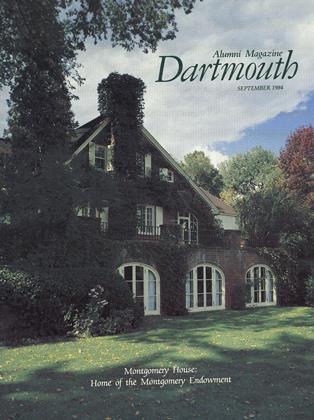There have been student moviemakers at Dartmouth ever since the beginning of readily-available cinematographic equipment it's a rare class that doesn't have some footage to show as a reminder of what life was like on campus back then. But student moviemaking is different nowadays. Partly it's a matter of the frequency with which finished movies get made; partly it's the way in which the subject matter goes far beyond the documenting of everyday life at the College. The class of 1984 seems to have been unusually active, and the past few months have brought forth a flurry of activity that's remarkable even for this generation.
Without doubt, a major factor in the increase in activity has been the availability of more sources of funding support than ever before. There have always been more good ideas than money to bring them to life, but perhaps the gap is narrowing now as the value of movies as a legitimate form of expression for talented students is more and more widely perceived.
Perhaps the most extraordinary project still in its early stages is the one that is helped by the most valuable of the awards available for filmmakers, the Arthur and Lillie Mayer Foundation award, established by the remarkable couple who played so vital a role in the College's film studies program for so many years. With money provided by the Mayer Foundation, Bram Towbin and Kevin Gorman, both '84, will be making a movie based on their finding six or eight people, utterly at random, who are willing to undertake the training needed for parachute jumping, to make a jump from a plane, and to allow their efforts to be filmed surely a project that presents countless opportunities for encountering the unpredictable.
Not only predictable, but totally controllable, is the subject matter of "Psycho"-analysis, a painstaking reconduction of the montage methods employed by Alfred Hitchcock in the pivotal murder-in-the-shower scene from Psycho. This project is being undertaken by Nick Armington 'B4 with a grant from the Peter D. Smith Student Initiative Fund, which the Friends of the Hopkins Center established in honor of the Center's second director at the time of his retirement from the post. In a nice concurrence, Smith himself speaks the narration of Armington's film.
From the awards program instituted by the Dartmouth Film Society using a part of the surplus income made from its series screenings one award to Rick Low '84 and one to Deborah Magocsi and Peter Ellis, both '84, are funding films based on original scripts and employing experimental techniques. And in New York, Jonathan Nossiter 'B4 will be editing a series of scenes from his own version of Aeschylus's Prome- theus Bound made during the spring term as part of a Senior Fellowship program.
The movie that's most likely to be seen widely within the Dartmouth family, though, is one made by '84s George Mannes and Cathy Luna, with assistance from the Marcus Heiman Project Awards, established by the father of the late Martin Rosenthal '56. This video project, called Kaffeeklatsch, chronicles the activities of the group of alumni from classes in the twenties and thirties who gather daily in the Byble and Drum Room of the Hanover Inn (every weekday of the year, in fact, except for Christmas Day) to talk over the happenings of the day national, international, and, of course, local and to share news and points of view. The film is an affectionate tribute by one generation of the Dartmouth family to another generation old enough, in a couple of instances at least, to be the great-grandfathers of the moviemakers. What the daily meetings mean to the participants is touchingly expressed, and the continuity of caring that characterizes Dartmouth men and women (several kaffeeklatsch wives are interviewed, too) is vividly revealed. Since the videoscope incorporates some footage from a film made in the midtwenties, the wheel comes full circle and brings home another kind of continuity within the family.
 View Full Issue
View Full Issue
More From This Issue
-
 Feature
FeatureDennis Brutus Speaks Out
September 1984 By Kendal Price '78 -
 Cover Story
Cover StoryThe Montgomery Endowment Finds a Home
September 1984 By Shelby Grantham -
 Feature
FeatureRichard Eberhart at Eighty: The Long Reach of Talent
September 1984 By Jay Parini -
 Feature
Feature"Three ... Forty-two ... Hut"
September 1984 By Jim Kenyon -
 Feature
Feature"Innocent Ardor and Delight": A Tribute to Richard Eberhart
September 1984 By James Melville Cox -
 Article
ArticleRumblings On Fraternity Row
September 1984 By Fred Pfaff '85







